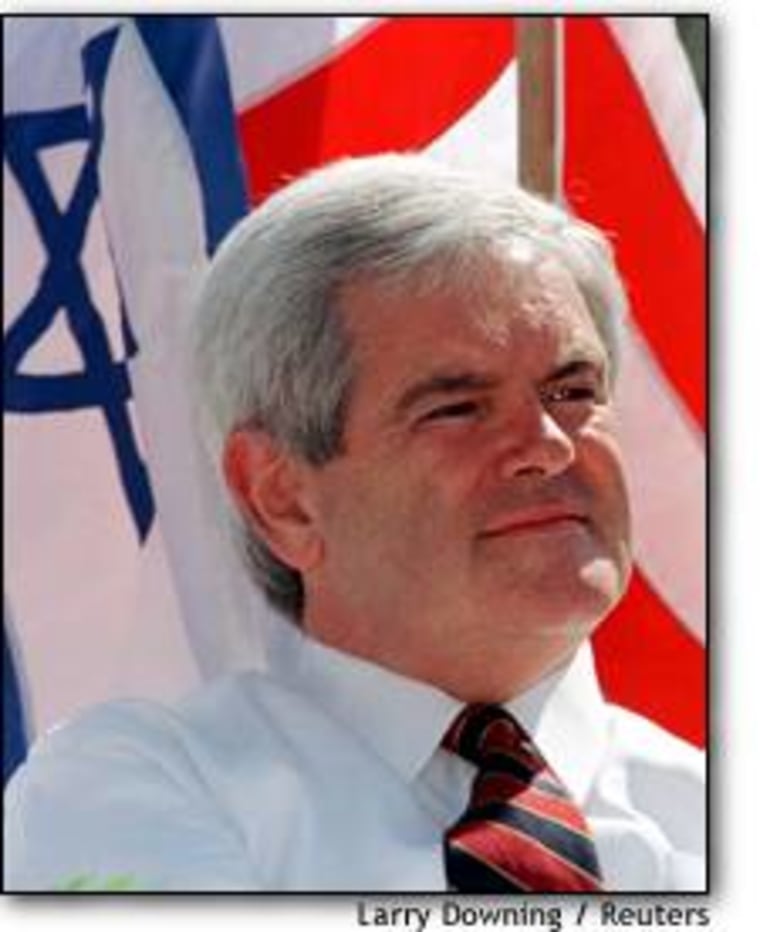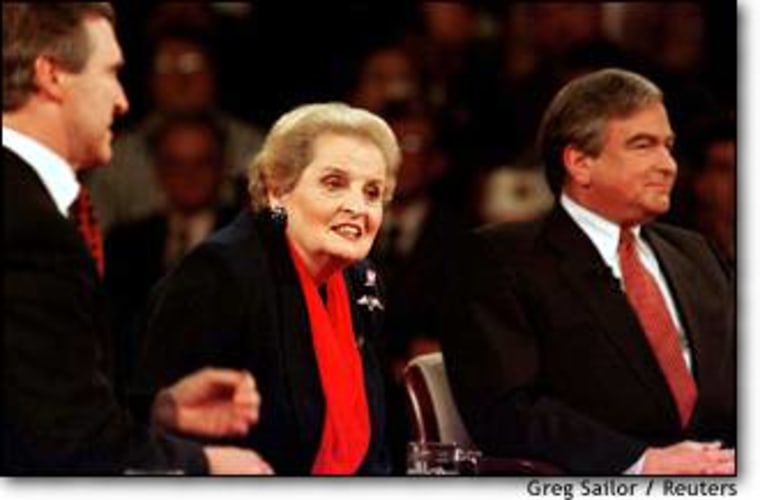Like a punch-drunk fighter, the United States has stumbled from one foreign crisis to another in recent years, largely invulnerable to its opponents yet strangely incapable of getting out ahead of events. In Bosnia and the Persian Gulf, in Mideast peace talks, on sanctions against Iran, Cuba, India and Pakistan, Washington’s word remains more important than any other, yet something less than might be expected of the world’s sole remaining superpower.
ONCE THE United States presented itself as a leader to be followed, with all the high-minded pretensions that phrase entails. Ironically, having vanquished its mortal enemy, the Soviet Union, the United States is in many ways less influential today on the world stage than it was in the 1950s and 1960s, at the height of Soviet Union’s power.
America’s economy is unmatched and its cultural exports — cinema, fast-food and basketball, to name a few — sweep all before them. Yet Israel, Pakistan, France and China — to name a few recent and very different examples — feel able to snub American diplomats and ignore American interests with impunity. What has changed to make this so?
THE DRIVER OR THE ROAD?
From those who analyze foreign policy and America’s role in the world, there come two basic answers to that question. One blames President Bill Clinton and his administration for failing to define and act in defense of U.S. strategic interests; the other argues that the post-Cold War world has obscured those vital interests so thoroughly that Washington cannot afford to see things in black-and-white terms until the outline of what will replace the Cold War order emerges.

Criticism of the Clinton administration’s foreign policy, rooted but by no means confined to the American right, has focused on the president’s willingness to use U.S. troops to enforce order in places like Haiti and , which the administration’s critics deem to be “marginal” to U.S. interests. Edwin Feulner, the president of the conservative Heritage Foundation, summed this criticism up neatly in a speech in Feb. 1996.
“America now has a foreign policy as chaotic as the world itself,” he said. “I do not believe such a policy can possibly offer the leadership that is needed to protect American interests. We have a policy of good intentions, as defined by a bunch of mushy-minded liberals. But in foreign policy, good intentions are not enough.”
Yet neither is criticism. Clinton officials are quick to concede privately that they have not managed to do what both Warren Christopher and during their confirmation hearings: to devise an overarching theme for American foreign policy to replace anti-communism. The closest this administration has come — “assertive multilateralism” — sounds more like the developmental disorder it resembles than any kind of coherent strategy for the next century.
That said, the American right has also failed in this regard. Anti-communism, spiced with outright xenophobia, remains the spiritual underpinning of current conservative foreign policy thinking. Gone is the Kissinger wing that viewed the world as a complex game of move and countermove with the emphasis on anticipating the opponent’s move.
Perhaps this is inevitable, given the absence of a credible threat to the United States. Yet the conservative emphasis on defense spending and unilateralism is anything but forward-looking. What’s more, it sits very uneasily with the post-Cold War Republican Party’s isolationist and protectionist tendencies. Republicans at the moment are lamenting a world where, as they see it, U.S. stature has fallen so low that India and Pakistan can boldly gate-crash the nuclear club. Yet they will not acknowledge that by choosing the politics of temper tantrums with regard to , Congress has profoundly discredited the United States in the eyes of much of the world.
THE TRANSITIONAL CONDITION
In fact, the idea that anyone is going to devise a cohesive foreign policy for the last years of the century is patently absurd. The bipolar world allowed the United States and Soviet Union to play the “if you’re not with me, your against me” game. It seemed to create hellish dilemmas at the time — should we be in Vietnam? What if Italy votes in a communist government? Is it right to fund abusive dictators like Mobotu or the Shah? Do we invade Cuba?
Certainly, these were wrenching dilemmas, yet during the Cold War, “national security” could be cited by any administration no matter how obscure or unlikely the case to justify American policy decisions. Under such conditions — wielding the trump card of “vital U.S. interests” — the United States funded secret wars against Nicaragua; prevented Israel, France and Britain from overrunning Egypt in 1956 and threw Taiwan out of the United Nations in favor of Beijing.
Similarly, in the “with me or against me” world, U.S. allies dared not challenge too openly the stated interests of the dominant power in their alliance. Yes, the French and Israelis occasionally struck a pose. But what Israeli leader ever refused an invitation, as Prime Minister Benjamin Netanyahu did last month, to talk peace at the White House? Equally, with Russia on the question of sanctions against Iraq, let alone vie with the CIA over the fate of a collapsing African nation like Zaire.
In a world with two alternatives, alienating the United States was not an option. In today’s world, powers like France and Israel and even desperately poor countries like Serbia and Pakistan find there is nothing in the U.S. goody bag worth giving up their own national aspirations to get.
No Democrat or Republican, elected or otherwise, has an answer for that reality.
HAS BEENS AND HOUYHNHNMS
Looking ahead, the view is not promising. The American political landscape is conspicuously devoid of towering foreign policy thinkers of the kind that can unite a nation behind a common purpose. In part, this reflects the misguided contentment of a country going through a period of affluence. When it comes to foreign policy right now, Americans — and the editors who control many American newsrooms, too — don’t want to hear about it. Nowhere will that reflect back as quickly as in the country’s politicians.

And what a dire picture that is, too. On the Republican side, Colin Powell is out, Bob Dole is gone, and Richard Lugar, the knowledgeable Republican senator from Indiana, proved himself unelectably decent in the 1996 campaign. John McCain, a more fiery Republican from Arizona, is a steady spokesman but no strategic thinker. How about Newt Gingrich? Another “diplomatic” visit to the Middle East like the one he just concluded and we’ll know for sure whether Israel has nuclear weapons. of course.
On the Democratic side, things are no better. Both Sam Nunn and Bill Bradley opted for quiet, lucrative retirement rather than seek to take the helm of the rudderless ship of state. Richard Gephardt sounds more like a UAW shop steward these days than a statesman. As for those actually in office, Al Gore’s been to lots of funerals, but if the current trend in Washington continues, he’ll be attending his own political funeral in Nov. 2000. As for Albright, her legacy thus far consists of one issue — NATO expansion. The end of winter was less predictable.
The good news here is that none of the world’s other nations seem to have any better sense of where the world is going. America’s clueless political class stands out more than most in part because of our size and in part because of our propensity to proclaim ourselves “the leaders of the free world” at every turn. Winston Churchill’s words on that subject work nicely here:
“You can always count on the Americans to do the right thing, but only after they exhaust all other opportunities.”
Judging from the line to succeed Clinton, we’ll be exhausting those opportunities for some time to come.
